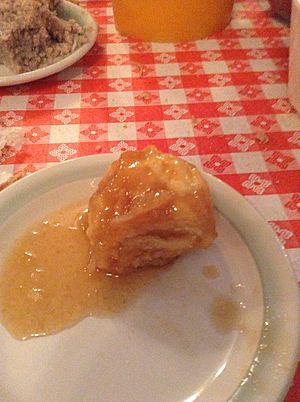Grands-pères facts for kids
Grand-pères are a yummy, traditional dessert from Quebec and Acadia. People also call them grand-pères au sirop d'érable or grand-pères dans le sirop d'érable. In some parts of Quebec, like Beauce, they are even called pépère. This sweet treat is often enjoyed during "le temps des sucres," which is maple syrup season, especially at places called sugar shacks.
Contents
What are Grand-pères?
Grand-pères are small, round cakes. They are made from a simple dough. The dough uses common ingredients like flour, baking powder, butter, milk, and sugar.
How are they made?
To make grand-pères, you drop these dough balls into boiling maple syrup. This helps them cook and soak up all the delicious maple flavor. Once they are ready, they are served warm. They usually come with the same boiled maple syrup. Sometimes, people also add a scoop of ice cream on the side.
Different flavors
While maple syrup is the classic choice, you can also use brown sugar instead. Some recipes even add a touch of vanilla for extra taste.
Fun Variations
This dessert has many tasty twists! You can find grand-pères stuffed with different fruits. Imagine them filled with juicy apples, sweet raspberries, or fresh strawberries. Some even have tangy blueberries inside. For a nutty flavor, you might find them with pecans. And if you love super sweet treats, there are even grand-pères filled with caramel!
Where did Grand-pères come from?
Many people believe this dessert first came from Acadia. This is a region in Eastern Canada. The name "grand-père" (which means "grandfather" in French) likely came about when the dish arrived in Quebec.
Why the name "Grand-père"?
There are a few fun ideas about how the dessert got its name:
- Some say it's because grandfathers could easily eat this soft dish. It was perfect even if they had lost their teeth!
- Another idea is that the round shape of the cake looked like an elderly person's face.
- A third story suggests that grandfathers were given the easy job of stirring the maple syrup. They would stir it in a big pot while the grand-pères cooked.
 | Anna J. Cooper |
 | Mary McLeod Bethune |
 | Lillie Mae Bradford |


